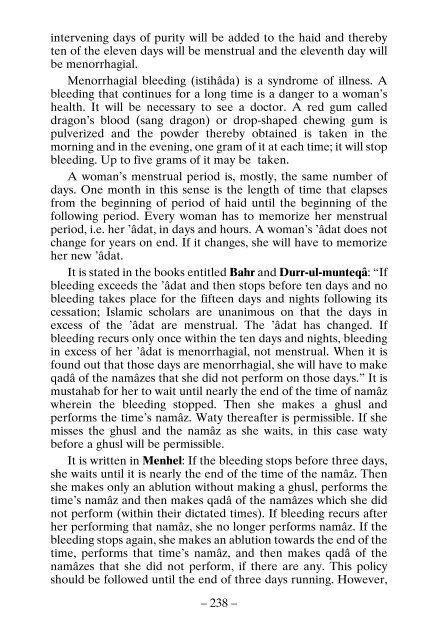O Son !
THE BOOK ‘O SON’ Al-hamdu lillâhi Rabbil ’âlamîn. Wa-s-salâtu wa-s-salâmu ’alâ Rasûlinâ Muhammadin wa Âlihi wa Sahbihi ajma’în. 1– O son! Collecting from books written by the scholars of the Hanafî Madhhab three hundred and sixty hadîth-i-sherîfs and forty-four khabars and also the seven essentials and the five rukns and the seven wâjibs and the fourteen sunnats and the twenty-five mustahabs and the fourteen mufsids of namâz, I have explained them for you. Adapt your acts and deeds to these teachings so that you attain fayz and nejât (salvation)! 2– Also for your information, I have collected a thousand and ninety âdâb (adabs) for you and for other young Muslims like you. If you adapt your actions and acts of worship to these teachings, they will be sufficient for you. If you laze, disobey Allâhu ta’âlâ and cease from these practices and manners, you will be afflicted with slavery and disgrace in the world and subjected to torment in the world to come. If you live up to them and advise your Muslim brothers to do the same, it will be useful for you. They will say blessings over you. And Haqq ta’âlâ will accept their invocations. For, a slave will be pardoned on account of another slave’s invocations for them.
THE BOOK ‘O SON’
Al-hamdu lillâhi Rabbil ’âlamîn. Wa-s-salâtu wa-s-salâmu ’alâ
Rasûlinâ Muhammadin wa Âlihi wa Sahbihi ajma’în.
1– O son! Collecting from books written by the scholars of the
Hanafî Madhhab three hundred and sixty hadîth-i-sherîfs and
forty-four khabars and also the seven essentials and the five rukns
and the seven wâjibs and the fourteen sunnats and the twenty-five
mustahabs and the fourteen mufsids of namâz, I have explained
them for you. Adapt your acts and deeds to these teachings so that
you attain fayz and nejât (salvation)!
2– Also for your information, I have collected a thousand and
ninety âdâb (adabs) for you and for other young Muslims like you.
If you adapt your actions and acts of worship to these teachings,
they will be sufficient for you. If you laze, disobey Allâhu ta’âlâ
and cease from these practices and manners, you will be afflicted
with slavery and disgrace in the world and subjected to torment in
the world to come.
If you live up to them and advise your Muslim brothers to do
the same, it will be useful for you. They will say blessings over you.
And Haqq ta’âlâ will accept their invocations. For, a slave will be
pardoned on account of another slave’s invocations for them.
Create successful ePaper yourself
Turn your PDF publications into a flip-book with our unique Google optimized e-Paper software.
intervening days of purity will be added to the haid and thereby<br />
ten of the eleven days will be menstrual and the eleventh day will<br />
be menorrhagial.<br />
Menorrhagial bleeding (istihâda) is a syndrome of illness. A<br />
bleeding that continues for a long time is a danger to a woman’s<br />
health. It will be necessary to see a doctor. A red gum called<br />
dragon’s blood (sang dragon) or drop-shaped chewing gum is<br />
pulverized and the powder thereby obtained is taken in the<br />
morning and in the evening, one gram of it at each time; it will stop<br />
bleeding. Up to five grams of it may be taken.<br />
A woman’s menstrual period is, mostly, the same number of<br />
days. One month in this sense is the length of time that elapses<br />
from the beginning of period of haid until the beginning of the<br />
following period. Every woman has to memorize her menstrual<br />
period, i.e. her ’âdat, in days and hours. A woman’s ’âdat does not<br />
change for years on end. If it changes, she will have to memorize<br />
her new ’âdat.<br />
It is stated in the books entitled Bahr and Durr-ul-munteqâ: “If<br />
bleeding exceeds the ’âdat and then stops before ten days and no<br />
bleeding takes place for the fifteen days and nights following its<br />
cessation; Islamic scholars are unanimous on that the days in<br />
excess of the ’âdat are menstrual. The ’âdat has changed. If<br />
bleeding recurs only once within the ten days and nights, bleeding<br />
in excess of her ’âdat is menorrhagial, not menstrual. When it is<br />
found out that those days are menorrhagial, she will have to make<br />
qadâ of the namâzes that she did not perform on those days.” It is<br />
mustahab for her to wait until nearly the end of the time of namâz<br />
wherein the bleeding stopped. Then she makes a ghusl and<br />
performs the time’s namâz. Waty thereafter is permissible. If she<br />
misses the ghusl and the namâz as she waits, in this case waty<br />
before a ghusl will be permissible.<br />
It is written in Menhel: If the bleeding stops before three days,<br />
she waits until it is nearly the end of the time of the namâz. Then<br />
she makes only an ablution without making a ghusl, performs the<br />
time’s namâz and then makes qadâ of the namâzes which she did<br />
not perform (within their dictated times). If bleeding recurs after<br />
her performing that namâz, she no longer performs namâz. If the<br />
bleeding stops again, she makes an ablution towards the end of the<br />
time, performs that time’s namâz, and then makes qadâ of the<br />
namâzes that she did not perform, if there are any. This policy<br />
should be followed until the end of three days running. However,<br />
– 238 –

















